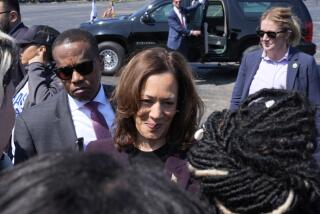Victory in Georgia Contest Viewed as Crucial to Clinton’s Campaign : Politics: The Arkansas governor’s advisers say the first Southern primary will show his true strength after an uncertain result in the New Hampshire vote.
- Share via
SAVANNAH, Ga. — As Arkansas Gov. Bill Clinton campaigned across the South on Thursday, he looked like a man who had survived a trip through treacherous waters.
But, as his aides look down the list of the eight Southern primaries that dominate the presidential calendar through March 10, they know that they have not cleared all the reefs.
After sidestepping disaster with a respectable second-place finish in Tuesday’s New Hampshire primary, Clinton returned to compete on his home turf--the region where his political and cultural ties are strongest. “It is wonderful to be in a place where I am the only candidate without an accent,” he told a crowd that gathered for a Wednesday afternoon rally in Atlanta.
But the same questions about marital infidelity and his draft status during the Vietnam War that threatened to capsize Clinton’s campaign in New Hampshire remain open in the South--a point illustrated by a handful of protesters who appeared late Thursday afternoon at his rally in Savannah.
If the South offers Clinton an opportunity to overtake former Massachusetts Sen. Paul E. Tsongas, the New Hampshire winner, it also presents the Arkansas governor with a test he cannot fail. That is especially true here in Georgia, whose March 3 primary marks the first test of whether Southern voters will still embrace Clinton after the allegations that have buffeted his campaign.
Clinton’s advisers see Georgia playing the same role in his campaign that New Hampshire played in George Bush’s 1988 race to the White House: the place where he demonstrates his true strength after an uncertain result in the first contest.
As Clinton well understands, that means he has no margin for error. With none of the other Democratic contenders broadly organized in Georgia--besides Clinton, only Nebraska Sen. Bob Kerrey has attracted any visible support--the Arkansas governor is, to a considerable extent, running against himself.
“You can’t construct much of a scenario of Bill Clinton winning the nomination if he doesn’t win Georgia,” one senior Clinton adviser acknowledged.
Clinton’s schedule this week reflects that priority. After he campaigned in Atlanta, he made two quick appearances in Florida and then returned to Albany, Ga., and Savannah on Thursday. He is due to spend today in Atlanta as well.
Political experts divide on how much Clinton has been hurt in Georgia and across the South. Pollster Alan Secrest, who has conducted surveys in Georgia for Democratic candidates, told the Atlanta Constitution this week that he believes that Clinton has been so badly wounded by the allegations of personal misconduct that he is “on something of a political death march at this point.”
But other analysts believe that Clinton’s Southern assets remain formidable, particularly in Georgia. Chief among them may be Georgia Gov. Zell Miller.
In an abrasively worded speech before Clinton’s Atlanta rally, Miller stressed two of Clinton’s other strengths: his regional identification and, even more important, the lack of a clear alternative for Southerners.
Signaling what Clinton aides say will be a more aggressive posture toward Tsongas in the South, Miller sharply criticized the New Hampshire winner as a cultural liberal and an economic elitist.
“The truth is,” Miller declared, “Paul Tsongas would lead the party we love right back down that well-worn path of defeat.”
That argument is likely to carry some force in a state where Michael S. Dukakis, another Greek-American from Massachusetts, carried only 16% of the 1988 primary vote and was crushed by Bush in the fall.
Clinton’s own message is evolving in the South. His speeches these past two days have been uncharacteristically disjointed--and occasionally even listless--as he searches for a tone that will move an audience more racially and culturally diverse than the crowds he addressed in New Hampshire.
In New Hampshire, for example, Clinton downplayed his calls for “personal responsibility” after his private surveys showed that many voters interpreted that to mean that they should accept blame for the state’s economic distress. But at a Thursday morning rally in Winter Haven--a small community in central Florida--Clinton again emphasized that theme.
In the same speech, Clinton jabbed at a potential Tsongas vulnerability. He told an audience liberally sprinkled with senior citizens that he opposes means-testing for Medicare, the federal health program for the elderly, and Social Security.
Under means-testing, a person’s income could affect his or her benefits.
Tsongas has talked about means-testing for Medicare and said that the government may have to look at toughening income restrictions on Social Security “way down the road.”
Since moving South, Clinton’s campaign also has taken aim at Tsongas’ view on capital punishment--an issue that was invisible in New Hampshire. On Wednesday, Miller sharply criticized Tsongas as an “anti-death penalty . . . politician.” Tsongas supports capital punishment only for crimes against society, such as major drug dealing.
Asked by reporters Thursday about Miller’s remarks, Clinton insisted that he has “never tried to raise the death penalty as a political issue.” But then he did just that, saying that he thought Tsongas’ position “was a fudge and a way of trying to have it both ways.”
More to Read
Get the L.A. Times Politics newsletter
Deeply reported insights into legislation, politics and policy from Sacramento, Washington and beyond. In your inbox twice per week.
You may occasionally receive promotional content from the Los Angeles Times.










